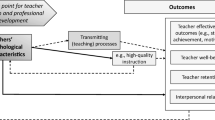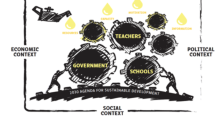Abstract
Recent publications on changes in education have paid considerableattention to the interplay of control and extended autonomy. Thisinterplay takes place on three levels: between government and theindividual school; between school and the individual teacher; andbetween teacher and student. At each level there are issues surroundingthe relationship between a top-down and a bottom-up approach to changesin education. The major questions to be answered are: what goals are tobe achieved; what means of direction and control should be preserved;who exercises control over the goals and processes; how extensive is theautonomy of schools, teachers and students; and will self-regulation andautonomy become a reality? In this article we describe the interplay oftop-down and bottom-up processes in recent changes in senior secondaryeducation in the Netherlands. These changes include introducingself-regulated learning by students, flexibility in teachers' tasks,liaison with advanced studies in higher education, and raisingstandards.
Similar content being viewed by others
REFERENCES
Akker, J. van den, Pieters, J., Visscher-Voerman, I. & Wald, A. (eds) (1998). Studiehuis en onderwijsonderzoek (Study House and Educational Research). Leuven/Apeldoorn: Garant.
Apple, M.A. (1982). Education and Power. London: Routledge and Kegan.
Apple, M.A. (1986). Teachers & Texts. London: Routledge and Kegan.
Apple. M.A. & Beane, J.A. (1995). Democratic Schools. Alexandria: ASCD.
Ball, S. (1987). Micropolitics of the School. London: Methuen/Routledge and Kegan.
Bandura, A. (eds) (1995). Self-efficacy in Changing Societies. Cambridge: Cambrige University Press.
Beck, U., Giddens, A. & Lash, S. (1994). Reflexive Modernization. Cambridge: Polity.
Beck, U. & Beck-Gernsheim E. (2002). Individualization.London: Sage Publications.
Bolhuis S. (1997). A State of the Art in Dutch Secondary Education. Paper presented at the EARLI-conference, Athens, August 1997.
Canady, R.L. & Rettig, M.D. (eds) (1995). Block Scheduling. Princeton: Eye on Education.
Castells, M. (1996). The Rise of the Network Society. Oxford: Blackwell Publishers.
Cohen, E. (1994). Designing Groupwork. New York: Teachers College Press.
Darling-Hammond, L. (1992). Reframing the school reform agenda. The School Administrator (November), 22–27.
Datnow, A. & Castellano, M. (2000). Teachers' responses to success for all: How beliefs, experiences, and adaptations shape implementation. American Educational Research Journal 37(3), 775–799.
Fullan, M. (1991). The New Meaning of Educational Change. New York: Teachers College Press.
Giroux, H.A. (1989). Schooling for Democracy: Critical Pedagogy in the Modern Age. London: Routledge.
Goodman, J. (1992). Elementary Schooling for Critical Democracy.New York: Suny.
Hargreaves, A. (1994). Changing Teachers, Changing Times. London: Cassell.
Hargreaves, A. & Fullan, M. (1998). What's Worth Fighting for Out There.New York: Teachers College Press.
Hartley, D. (1997). Re-schooling Society. London: Falmer Press.
Hofmeister, J. (1998). Evaluation research findings of the pre-university project on transition and student mentoring. In S. Goodlad (ed), Mentoring and Tutoring by Students (pp. 107–118). London: Kogan Page.
Horn, R.A. Jr. & Kincheloe, J.L. (eds) (2001). American Standards.Quality Education in a Complex World. New York: Peter Lang Publishing.
Hout-Wolters, B.H.A.M. van, Simons, P.R.J. & Volet, S. (2000). Active learning: self-directed learning and independent work. In P.R.J. Simons, J.L. van der Linden & T.M. Duffy (eds), New Learning. Dordrecht: Kluwer.
Lieberman, A. (ed) (1995). The Work of Restructuring Schools. New York: Teachers College Press.
Lieberman, A. (1996). Creating intentional learning communities. Educational Leadership 54(3), 51–55.
McCormick, C.B. & Presley, M. (1997). Educational Psychology. New York: Longman.
Newmann, F.M. (1993). Beyond common sense in educational restructuring. The issues of content and linkage. Educational Researcher 22(2), 4–13.
Oser, F.K. (1994). Moral perspectives on teaching. Review of Research in Education 20, 57–127.
Ranson, S. (1994). Towards a Learning Society. London: Cassell Education.
Riemersma, F. & Veugelers, W. (1997). Varianten van studiehuis (Variations of Study House). Amsterdam: SCO.
Sikes. P.J. (1992). Imposed changes and the experienced teacher. In M. Fullan & A. Hargreaves (eds), Teacher development and Educational Change (pp. 36–55). London: Falmer Press.
Veugelers, W. (1989). The modular approach in the Netherlands: rationalities between education and labor. In J.T. Voorbach and L.G.M. Prick (eds), Teacher Education 5 (pp. 45–54). 's Gravenhage: SVO.
Veugelers, W. (2000). Different ways of teaching values. Educational Review 50(1), 37–46.
Veugelers, W. (2001). Teaching values and critical thinking. In S.R. Steinberg (eds), Multi/Interculturalism (pp. 189–201). New York: Peter Lang Publishing.
Veugelers, W. (2002). Hoe staat het met de invoering van het studiehuis? (How about the implementation of the study house?). Meso 22(122), 3–10.
Veugelers, W. & De Kat, E. (2000). De pedagogische opdracht van het studiehuis (Moral Education in the Study House). Amsterdam: University of Amsterdam/ILO.
Veugelers, W. & Zijlstra, H. (eds) (1995). Netwerken aan de bovenbouw van havo en vwo (Networking on Secondary Education). Leuven/Apeldoorn: Garant.
Veugelers, W. & Zijlstra, H. (1996a). Networks for modernizing secondary schools. Educational Leadership 54(3), 76–80.
Veugelers, W. & Zijlstra, H. (eds) (1996b). Praktijken uit het studiehuis (Good Practices from the Study House). Leuven/Apeldoorn: Garant.
Veugelers, W. & Zijlstra, H. (1998a). Learning together in networks of schools and university. International Journal of Leadership in Education 1(2), 169–180.
Veugelers, W. & Zijlstra, H. (eds) (1998b). Lesgeven in het studiehuis (Teaching in the Study House). Leuven/Apeldoorn: Garant.
Veugelers, W. & Zijlstra, H. (eds) (2001). Leren in het studiehuis (Learning in the Study House). Leuven/Apeldoorn: Garant.
Veugelers, W. & Zijlstra, H. (2002). What goes on in a network? Some Dutch experiences. International Journal of Leadership in Education 5(2), 163–174.
Wertsch. J.V., Del Rio, P. & Alvarez A. (eds) (1995). Sociocultural Studies of Mind. Cambridge: Cambridge University Press.
Author information
Authors and Affiliations
Rights and permissions
About this article
Cite this article
Veugelers, W. Between Control and Autonomy: Restructuring Secondary Education in the Netherlands. Journal of Educational Change 5, 141–160 (2004). https://doi.org/10.1023/B:JEDU.0000033070.80545.01
Issue Date:
DOI: https://doi.org/10.1023/B:JEDU.0000033070.80545.01




